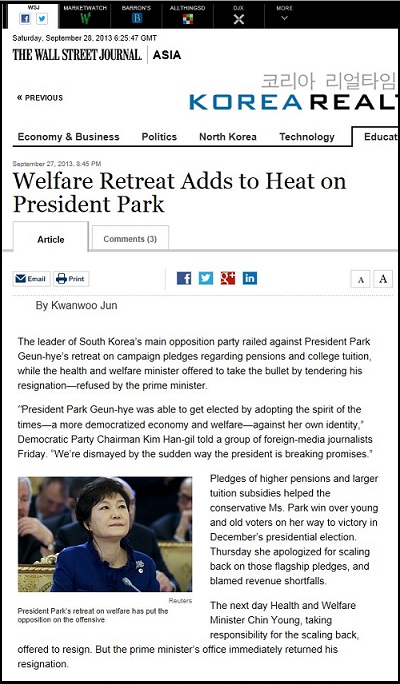“朴 복지공약 철회 또 다른 비판 요소”
미국의 경제 전문지 월스트리트 저널(이하 WSJ)이 박근혜 대통령의 복지 공약 축소와 관련 “박근혜의 대규모 복지 공약들은 이미 실패가 예정된 것일 수 있었다”고 보도했다.
WSJ은 27일 “복지공약 철회가 박근혜 대통령에 대한 비판의 또 다른 요소가 되고 있다(Welfare Retreat Adds to Heat on President Park)”는 제목의 기사를 통해 “한국은 침체되고 있는 경제 투자, 상승하는 가계와 국가부채 그리고 줄어드는 세수로 인해서 역풍을 맞고 있다”며 이같이 전했다.
박근혜 대통령의 대선 당시 복지 공약과 관련 WSJ은 “선거 운동 기간에, 박근혜 대통령은 65세 이상 노인에게 매달 연금 20만원을(190달러)지급하겠다고 약속했다”고 밝혔다.
이어 “그러나 내년도 예산안은 이보다 더 작은 액수, 그리고 약속했던 것보다 30% 더 적은 숫자의 사람들에게 지급할 만큼이 책정되었고 대학생 학비 보조금 지원도 1년 후인 2015년까지 연기되었다”고 설명했다.
WSJ은 “높은 액수의 연금과 더 많은 학비 보조금 지급 공약은 보수후보인 박근혜 씨가 젊은이와 노년 유권자에게서 표를 더 얻어 12월 대선 승리를 하는데 기여했다”고 평가하고는 “목요일(26일) 박근혜 대통령은 핵심 공약의 축소에 대해 사과했고, 세수 부족이 그 원인”이라고 말했다고 보도했다.

WSJ은 또 “박근혜 대통령은 스스로의 정체성과는 상반되나, 당시의 기류에 맞는 보다 민주적인 경제와 복지를 추구하는 정책을 채택하여 대통령에 당선되었다. 박 대통령이 자신의 공약을 갑작스럽게 파기하는 방식에 경악할 따름이다”는 김한길 민주당 대표의 발언을 전하기도 했다.
WSJ은 민주당의 장외투쟁에 대해서도 언급했다. 해당보도에서 WSJ은 “야당은 한 달 동안 작년 대선 개입혐의를 받고 있는 국정원의 개혁과 박근혜 대통령의 사과를 요구하며 거리 투쟁에 나와 있다”며 “이를 위해 심지어 서울 중심에 천막 사무소를 설치했다”고 보도했다. (☞ 기사원문 보러가기)
| 다음은 정상추 네트워크의 ‘WSJ’ 기사 번역 전문 Welfare Retreat Adds to Heat on President Park The leader of South Korea’s main opposition party railed against President Park Geun-hye’s retreat on campaign pledges regarding pensions and college tuition, while the health and welfare minister offered to take the bullet by tendering his resignation—refused by the prime minister. “President Park Geun-hye was able to get elected by adopting the spirit of the times—a more democratized economy and welfare—against her own identity,” Democratic Party Chairman Kim Han-gil told a group of foreign-media journalists Friday. “We’re dismayed by the sudden way the president is breaking promises. Pledges of higher pensions and larger tuition subsidies helped the conservative Ms. Park win over young and old voters on her way to victory in December’s presidential election. Thursday she apologized for scaling back on those flagship pledges, and blamed revenue shortfalls. The next day Health and Welfare Minister Chin Young, taking responsibility for the scaling back, offered to resign. But the prime minister’s office immediately returned his resignation. On the campaign trail, Ms. Park promised a monthly pension of 200,000 won ($190) for those aged 65 or older. But her budget plan for next year offers a smaller payment, and to 30% fewer people. It also delays planned college-tuition subsidies by one year until 2015. “I’m standing here today with a heavy heart to speak about the bleak reality of the nation’s democracy, which faces a grave crisis,” the novelist-turned politician Mr. Kim said. The opposition party has been taking to the streets for a month, calling for an overhaul of the nation’s spy agency—suspected of having meddled in the presidential election—and an apology from Ms. Park. It has even set up a tent office in central Seoul to press its case. Ms. Park’s big welfare commitments may have been destined to fail: South Korea faces headwinds from slowing business investment, rising household and sovereign debt and dwindling tax revenue. The growth rate of Asia’s fourth-largest economy in 2012 was just 2%, the slowest in three years and down from 3.6% in 2011. The government forecasts 2.7% growth this year and 3.9% next year. |


